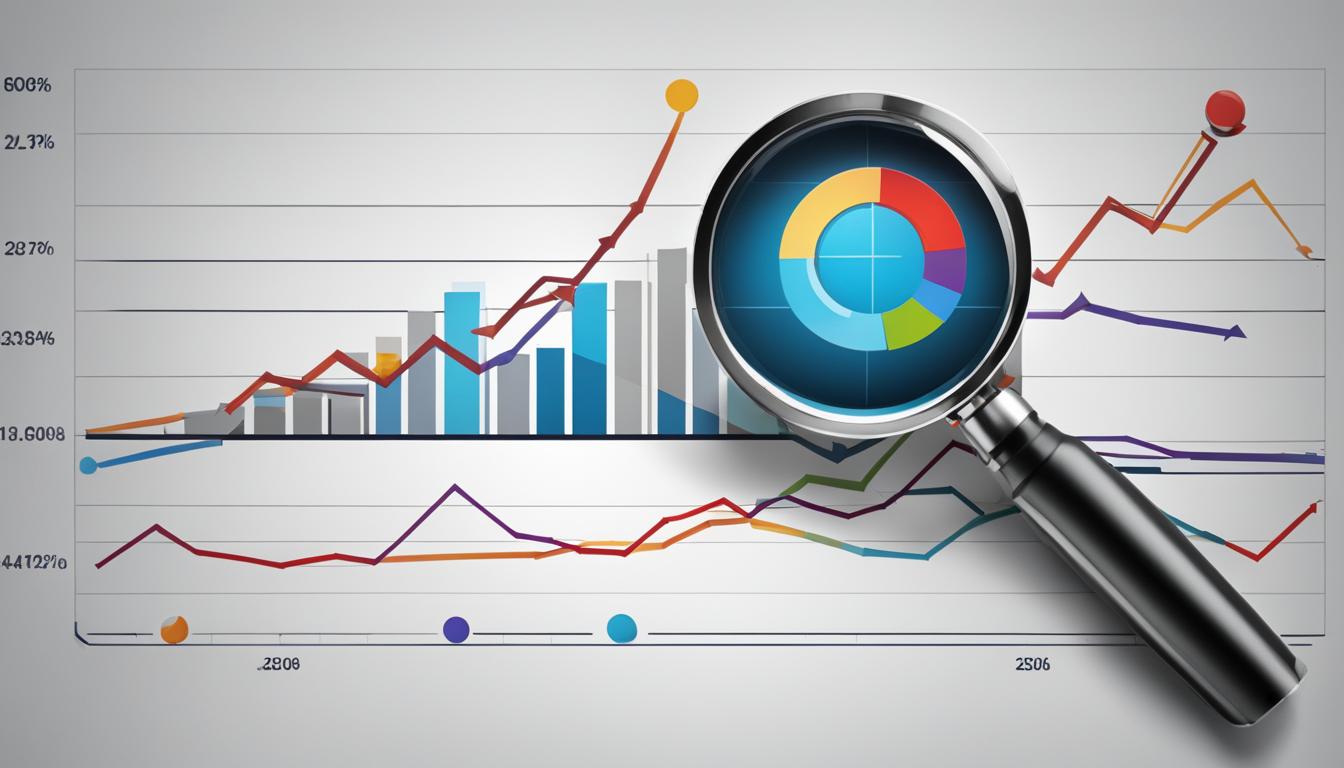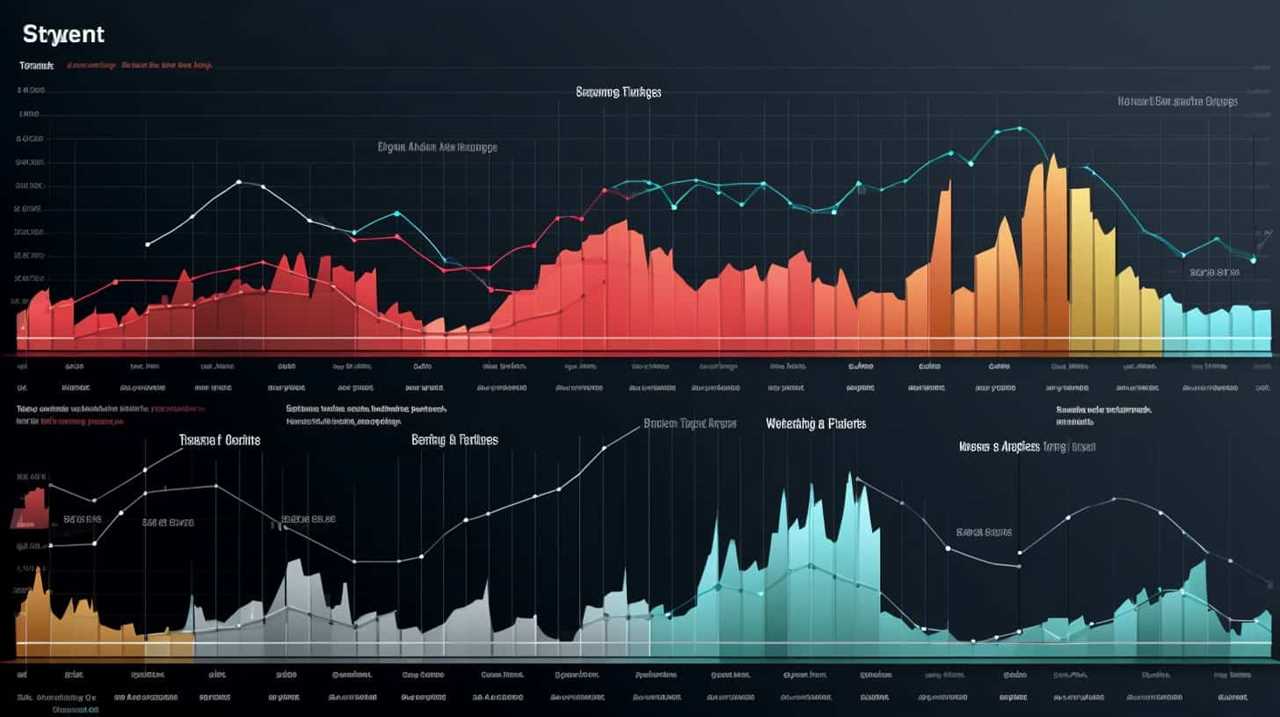Reliable, high-grade content is crucial for improving your search engine rankings. Targeting specific keyword phrases for each web page greatly amplifies your SEO endeavors. By strategically inserting keywords in the URL, page title, headings, and main text, you can markedly elevate your ranking in search outcomes. Regularly updating your content and adjusting the metadata are vital actions for boosting your website’s SEO.
Key Takeaways:
- High-quality content is essential for improving search engine rankings.
- Targeting specific keyword phrases can greatly impact your SEO performance.
- Strategically place keywords in URL, page title, headings, and content.
- Regularly update your content and optimize metadata for better SEO.
- Utilize our SEO ranking report to boost your website’s traffic.
Publish Relevant, Authoritative Content
Creating high-quality, relevant, and authoritative content is essential for improving your website’s search engine rankings. By providing valuable information to your audience, you can increase your site traffic, authority, and relevance in the eyes of search engines.
One key aspect of creating authoritative content is to identify and target specific keyword phrases for each page on your website. By strategically placing these keywords in the URL, page title, headings, and content, you can optimize your pages for search engine visibility.
Repeat the keyword phrase throughout the page to signal to search engines the relevance of your content. However, remember to do this naturally and avoid keyword stuffing, as it can negatively impact your rankings. Additionally, provide authoritative and credible information to engage users and improve your SEO performance.
Remember, web writing skills play a crucial role in producing quality content. Focus on developing compelling headlines, clear and concise writing, and logical organization of your content. By publishing authoritative content that caters to your target audience’s needs, you can improve your website’s search engine rankings and attract more organic traffic.
Update Your Content Regularly
Regularly updating your content is crucial for maintaining its relevancy and attracting organic traffic. Conducting content audits and making necessary updates and improvements is a key aspect of SEO. Blogging and creating additional content, rich with keyword phrases, can also boost search engine rankings. Interlinking related webpages and blog posts can provide readers with a better overall picture and improve SEO performance.
A content audit involves evaluating all the content on your website to ensure it is up to date and relevant to your target audience. This includes checking for outdated information, broken links, and improving the overall user experience. By regularly updating your content, you can ensure that it remains fresh and valuable to both search engines and users.
Benefits of Regular Content Updates
- Improved Search Engine Ranking: Search engines appreciate websites that provide fresh and updated content. By consistently updating your content, search engines are more likely to view your website as a reliable and authoritative source, improving your search engine ranking.
- Increased Organic Traffic: When your content is regularly updated, search engines will be more likely to crawl and index your website, which can lead to increased organic traffic. Additionally, refreshing your content can help you target new keywords and reach a broader audience.
- Enhanced User Experience: By updating your content, you ensure that your website remains relevant and engaging for your users. When visitors find valuable and up-to-date information, they are more likely to stay longer on your site, reducing bounce rates and improving user satisfaction.
- Opportunity for Internal Linking: When you regularly update your content, you create more opportunities for internal linking. Internal links help search engines understand the structure and hierarchy of your website, improving its overall SEO performance.
In summary, regularly updating your content is a crucial aspect of SEO. By conducting content audits, creating new blog posts, and interlinking related pages, you can improve your search engine rankings, increase organic traffic, enhance the user experience, and provide valuable and up-to-date information to your audience.
Metadata Optimization
When it comes to optimizing your website for search engines, metadata plays a crucial role. Metadata refers to the information that appears in search results and browser windows, providing users with a preview of your webpage. By optimizing your metadata, you can improve your search engine rankings and attract more organic traffic.
The Importance of Title Metadata
One of the most important elements of metadata is the title metadata. This is the headline that appears in search engine results and at the top of a browser window. It is essential to create a well-thought-out title that is rich with relevant keyword phrases. By strategically placing keywords in your title metadata, you can increase your website’s visibility and improve its chances of ranking higher in search engine results.
The Power of Description Metadata
In addition to the title metadata, the description metadata plays a significant role in attracting users to click on your website. This text appears below the title in search results and should provide a concise and appealing description of your webpage. By crafting compelling descriptions that highlight the value of your content, you can encourage users to click through to your site, ultimately increasing your organic traffic.
“Optimizing your metadata is an essential part of your SEO strategy. By creating title and description metadata that are rich in relevant keywords and enticing to users, you can significantly improve your search engine rankings and attract more organic traffic to your website.”
Furthermore, it’s worth mentioning keyword metadata. Although it’s rarely used for rankings, including keyword metadata can still contribute to the relevance of your webpage. By aligning your keyword metadata with your content, you can enhance the overall optimization of your website and improve its visibility in search results.
Lastly, don’t forget about alt tags. Alt tags are descriptions that you provide for images and videos on your webpage. Adding keyword-rich alt tags not only helps search engines understand the content of your media but also improves your website’s visibility. By optimizing your metadata, including title and description metadata, keyword metadata, and alt tags, you can boost your search engine rankings and drive more organic traffic to your site.
| Metadata | Importance | Optimization Tips |
|---|---|---|
| Title Metadata | Crucial | Create a title that is rich in relevant keywords, accurately describes your content, and entices users to click. |
| Description Metadata | Important | Write a concise and compelling description that showcases the value of your webpage and encourages users to click through. |
| Keyword Metadata | Relevant | Align your keyword metadata with your content to enhance its relevance and improve your website’s optimization. |
| Alt Tags | Essential for media | Add keyword-rich alt tags to describe your images and videos, improving search engine visibility and user experience. |
Have a Link-Worthy Site
Building a link-worthy website is crucial for effective search engine optimization. By creating a content-rich website and publishing authoritative content, you can attract high-quality backlinks and improve your search engine rankings. Link building plays a significant role in enhancing your website’s authority and credibility, and it is an essential aspect of any successful SEO strategy.
To have a link-worthy site, focus on developing high-quality, informative, and valuable content that resonates with your target audience. By providing unique insights, practical tips, and engaging stories, you can establish your website as a go-to resource in your industry. This will naturally attract links from other websites and further boost your SEO performance.
When it comes to link building, it’s important to include relevant links within your content and use descriptive anchor text. This not only helps with SEO but also adds value to your readers by directing them to additional resources. Additionally, consider linking to authoritative sources, both within your website and on external websites, to strengthen your website’s authority and provide further credibility to your content.
Table: Benefits of Link Building
| Benefit | Description |
|---|---|
| Increase Search Engine Rankings | Link building is a major factor in determining search engine rankings. Quality backlinks from reputable websites signal to search engines that your website is valuable and authoritative. |
| Drive Referral Traffic | When other websites link to your content, it opens up opportunities for referral traffic. Users who discover your website through backlinks are more likely to become engaged and take desired actions. |
| Boost Authority and Credibility | Having a strong portfolio of high-quality backlinks can significantly enhance your website’s authority and credibility in the eyes of both users and search engines. |
| Expand Audience Reach | When your content is linked to from other websites, it exposes your brand and content to new audiences, providing an opportunity for increased visibility and growth. |
Overall, creating a link-worthy site is essential for successful SEO. By producing authoritative content, building links, and establishing your website as a valuable resource, you can enhance your search engine rankings, drive more organic traffic, and improve your overall online presence.
Optimize for Mobile and Technical SEO
When it comes to improving your website’s search engine rankings, optimizing for mobile and technical SEO is crucial. With the increasing number of users accessing the internet through their mobile devices, it is essential to ensure that your website provides a seamless user experience across all platforms. Mobile optimization involves making your website responsive, ensuring fast loading times, and optimizing images and media for mobile devices.
For a better user experience, it is important to implement technical SEO best practices. This includes optimizing your website’s URL structure to be clean and organized, making it easier for search engines to understand and index your content. Additionally, implementing schema markup can enhance rich snippets and improve the visibility of your content in search results.
By prioritizing mobile optimization and technical SEO, you can improve your website’s search engine rankings and provide a better user experience for your visitors.

Benefits of Mobile Optimization:
- Improved user experience
- Higher search engine rankings
- Increased visibility in mobile search results
- Higher conversion rates
Technical SEO Best Practices:
- Optimize website speed and performance
- Implement structured data using schema markup
- Create a clean and organized URL structure
- Ensure mobile responsiveness and compatibility
By taking these steps to optimize for mobile and implement technical SEO best practices, you can enhance your website’s performance, improve search engine rankings, and provide a better user experience for your audience.
Understanding Organic Traffic
Organic traffic is a term used in search engine optimization (SEO) to refer to the number of website visitors that come from unpaid search engine results. This means that when users search for a specific keyword or topic related to your website, and your website appears in the search results without any paid promotion, the traffic generated from those clicks is considered organic.
There are several types of traffic that can drive visitors to your website. Aside from organic traffic, there is paid traffic, direct traffic, referral traffic, and social traffic. Paid traffic comes from pay-per-click (PPC) ads, where you pay for each click that drives users to your website. Direct traffic refers to visitors who type your website URL directly into their browser. Referral traffic comes from links on other websites that lead to your site. Lastly, social traffic is generated from social media platforms where users click on links that lead to your website.
Organic traffic is highly valuable because it is free and can reach new audiences that are specifically looking for the products or services you offer. Unlike paid traffic, which requires continuous investment, organic traffic is sustainable and can drive traffic to your website for years to come with minimal additional effort. It also helps establish credibility and visibility as users are more likely to trust and engage with organic search results.
Organic Traffic vs. Paid Traffic
While paid traffic can be effective for quickly driving visitors to your website, it can also be expensive and may not always generate sustainable results. On the other hand, organic traffic may take longer to build, but it has the potential to generate a larger volume of clicks without incurring direct costs. This makes organic traffic a cost-effective long-term investment for businesses looking to establish a strong online presence.
By focusing on improving your website’s search engine rankings, targeting relevant keywords, and providing high-quality content, you can increase organic traffic and unlock its numerous benefits. Building a diverse and well-rounded traffic strategy that includes both organic and paid traffic can help grow your online presence and drive valuable visitors to your website.
Benefits of Organic Website Traffic
Organic website traffic offers numerous advantages for businesses looking to boost their online presence. Let’s explore the key benefits of organic traffic:
1. Free Traffic
Organic traffic is free, making it a cost-effective way to attract visitors to your website. By implementing solid SEO strategies, you can optimize your website to rank higher in search engine results and generate organic traffic without incurring direct costs. This means you can drive a steady stream of visitors to your site without paying for each click.
2. Brand Awareness
Generating organic traffic helps to build brand awareness. When your website appears in the top search results for relevant keywords, it increases your visibility and exposure to potential customers. Consistently appearing as a reliable source of information in search engine results can help establish your brand as a trusted authority in your industry.
3. Targeted Traffic
Organic traffic is highly targeted, meaning that the visitors coming to your website are actively searching for the products or services you offer. By optimizing your website for relevant keywords and providing valuable content, you can attract a steady stream of qualified leads who are more likely to convert into customers or clients.
4. Global Reach
One of the key advantages of organic traffic is its global reach. With effective SEO strategies, you can target specific regions or even reach a worldwide audience. This allows you to expand your reach beyond local markets and tap into new customer bases, helping to grow your business on a larger scale.
| Benefits of Organic Traffic | |
|---|---|
| Free Traffic | Cost-effective way to attract visitors without direct costs |
| Brand Awareness | Builds credibility and establishes your brand as an authority |
| Targeted Traffic | Attracts qualified leads actively searching for your offerings |
| Global Reach | Extends your reach to a wider audience, locally and internationally |
Overall, organic website traffic offers a range of benefits, including being cost-effective, enhancing brand awareness, attracting targeted visitors, and expanding your global reach. By implementing a strong content and SEO strategy, you can leverage these advantages to drive sustainable and long-lasting growth for your business.

Organic vs. Paid Traffic Value
The value of organic traffic versus paid traffic is a topic of great significance in the world of SEO. While paid traffic can provide immediate results, organic traffic offers long-term benefits and sustainable growth. Let’s delve into the cost of paid traffic, the value of organic traffic, and how to estimate the potential of organic traffic.
The Cost of Paid Traffic
Paid traffic involves investing in online advertising to drive traffic to your website. This can include pay-per-click (PPC) campaigns on search engines or display ads on social media platforms. While paid traffic can be effective in delivering instant results, it comes at a cost. Advertisers need to allocate a budget for their campaigns, and the cost can vary depending on factors such as keyword competitiveness, target audience, and ad placement.
The Value of Organic Traffic
Organic traffic, on the other hand, refers to the visitors that come to your website through unpaid search engine results. While it requires an investment in SEO and content creation, organic traffic provides several advantages. Firstly, it is free, which means you don’t have to pay for each click or impression. Secondly, organic traffic has the potential to generate a larger volume of clicks without incurring direct costs, making it a cost-effective long-term strategy.
Estimating Organic Traffic Potential
Estimating the potential of organic traffic can be done using tools such as Semrush’s Organic Research tool. This tool provides insights into the estimated cost of replicating organic traffic through paid clicks. By analyzing keyword rankings, search volume, and estimated cost-per-click data, you can get a sense of the value organic traffic brings to your website.
| Organic Traffic | Paid Traffic |
|---|---|
| Free | Costs money |
| Long-term benefits | Immediate results |
| Targets specific intent | Targets broader audience |
| Builds credibility and visibility | Increases brand awareness |
| Potential for sustainable growth | Scalable with budget |
In conclusion, while paid traffic can provide a quick boost to your website’s visibility, organic traffic offers long-term benefits and sustainable growth without direct costs. By understanding the cost of paid traffic and the value of organic traffic, you can make informed decisions about your SEO strategy and allocate resources effectively.
Conclusion
In conclusion, building organic SEO traffic is a long-term investment that requires a consistent SEO strategy and following best practices. At our agency, we understand the value of SEO in driving targeted traffic to your website and improving your online presence. By implementing effective SEO techniques, we can help your website rank higher in search engine results, resulting in increased visibility and organic traffic.
To showcase the value of our SEO services, we closely monitor and report on SEO traffic progress. Using a marketing dashboard, we provide our clients with an easy-to-understand visualization of their marketing metrics and SEO key performance indicators (KPIs). This allows us to track the success of our strategies and demonstrate the impact on your bottom line.
Investing in organic SEO traffic not only brings long-term benefits but also proves to be cost-effective in the long run. Unlike paid traffic, organic traffic generates clicks without incurring direct costs, making it a valuable asset for your business. By leveraging our expertise in SEO and continuously optimizing your website, we can help you establish a strong online presence and drive sustainable growth.
So, if you’re looking to unlock the full potential of organic SEO traffic, trust our agency to deliver results. With our proven strategies, dedication, and the power of the marketing dashboard, we will help you achieve your SEO goals and maximize the value of your website.
FAQ
What is an SEO ranking report?
An SEO ranking report is a detailed analysis of your website’s search engine rankings. It provides insights into your website’s performance in search engine results pages (SERPs) for specific keywords and phrases.
Why is a website ranking analysis important?
A website ranking analysis is important because it helps you understand how well your website is performing in search engine results. It provides valuable data that can guide your SEO strategy and help you improve your website’s visibility and organic traffic.
What is a search engine optimization report?
A search engine optimization report is a comprehensive assessment of your website’s SEO performance. It includes key metrics such as organic traffic, keyword rankings, backlinks, and technical SEO issues, providing valuable insights for optimizing your website.
How can I improve my search engine ranking analysis?
To improve your search engine ranking analysis, focus on creating high-quality and relevant content, optimizing metadata, regularly updating your website’s content, building authoritative backlinks, and optimizing your site for mobile devices.
Why is authoritative content important for SEO?
Authoritative content is important for SEO because search engines prioritize high-quality and trustworthy content. Creating content that is relevant, informative, and valuable to your target audience can significantly improve your website’s search engine rankings.
How can I identify the right keyword phrases for my website?
To identify the right keyword phrases for your website, conduct keyword research. Use tools like Google Keyword Planner or SEMrush to find relevant keywords with a good search volume and low competition. Choose keywords that align with your target audience’s search intent and incorporate them strategically throughout your website.
Where should I place keywords to improve my search engine ranking?
Keywords should be strategically placed in the URL, page title, headings, and content of each webpage. Repeat the keyword phrase throughout the page, but make sure it sounds natural and doesn’t compromise the quality of the content.
How often should I update my website’s content?
It is important to regularly update your website’s content to keep it fresh and relevant. Aim for regular content updates, such as weekly blog posts or monthly content audits, to ensure your website remains up-to-date and engaging for users.
What is metadata optimization?
Metadata optimization involves optimizing the title metadata, description metadata, and keyword metadata of your webpages. These metadata elements provide valuable information to search engines and can help improve your website’s visibility and click-through rates in search engine results.
How can I make my website link-worthy?
To make your website link-worthy, focus on creating high-quality and valuable content that others will want to reference and share. Additionally, make sure to include relevant links within your content and use descriptive anchor text to improve your website’s search engine rankings.
What is mobile optimization?
Mobile optimization refers to the process of optimizing your website’s design, structure, and content to ensure a seamless user experience on mobile devices. This includes optimizing images and other media for faster loading, implementing responsive design, and following technical SEO best practices.
What is organic traffic?
Organic traffic refers to the number of website visitors that come from unpaid search engine results. It is a valuable source of traffic as it is free, targeted, and can generate sustainable growth for your website.
How can organic traffic benefit my website?
Organic traffic provides numerous benefits for your website, including increased visibility, targeted traffic, improved brand awareness, and credibility. It is a cost-effective way to attract new audiences and can result in long-term growth and success for your website.
How is organic traffic different from paid traffic?
Organic traffic comes from unpaid search engine results, while paid traffic comes from pay-per-click ads. Organic traffic is advantageous as it is free and can generate targeted traffic, while paid traffic requires a financial investment but can provide immediate visibility.
How can I estimate the value of organic traffic?
Tools like Semrush’s Organic Research tool can provide insights into the estimated cost of replicating organic traffic through paid clicks. This can help you understand the value of organic traffic and the potential return on investment of your SEO efforts.
How can I showcase the value of SEO services to clients?
By monitoring and reporting on SEO traffic progress, agencies can showcase the value of SEO services to clients. Using a marketing dashboard can help visually represent clients’ marketing metrics and SEO key performance indicators (KPIs) to demonstrate the impact on their bottom line.









